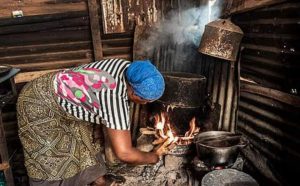
#OutToLunch Subsidize electric cookers for Ugandans to enjoy new cooking tariff
#OutToLunch Subsidize electric cookers for Ugandans to enjoy new cooking tariff By Denis Jjuuko You have seen the photos. I think largely taken to trend on social media platforms. Kampala’s hot girls in the village for the holiday season trying all sort of styles to blow air in the fireplace to cook the food. Uganda largely depends on firewood as its source of energy. Using firewood in Uganda is the norm rather than exception. Of course in some areas, some other energy sources might be expensive or even non-existent but it is also the way we have lived since the days of Kintu or Gipir and Labong. We don’t seem to know any other way. When Ugandans migrate to urban areas, they adopt charcoal as their main source of energy for cooking. Truckloads of charcoal are delivered every night in Kampala. In the suburbs, trucks move door to door with young men shouting at the top of their voices of the availability of charcoal at what they call crazy prices. Many roadside entrepreneurs in the suburbs survive on selling charcoal. It is beaming business. In most of these households where charcoal is used, electricity is available too. The perception about charcoal is that it is a cheap source of energy. I think it is just a perception. The cost of charcoal is perhaps the same as electricity or liquefied petroleum gas. And obviously much more expensive than biogas, which we have failed to adopt in Uganda. I find charcoal too dirty to use. Cumbersome to use and like firewood, a big source of indoor pollution that according to the World Health Organisation is responsible for about 4.3 million deaths annually. Some of the noncommunicable diseases that are increasingly killing Ugandans are a result of this pollution. The cost to the economy is beyond measure. But talking about costs, the household loses money every time they use charcoal. There is no switch on a sigiri (charcoal stove) which you can control as you cook. Many times, once the cooking is done, the burning charcoal is wasted, which translates into money lost. Then many of the charcoal sellers today are unscrupulous. Many times, sacks of charcoal are packed with residual parts (olusenyente in Luganda) which is hardly usable unless you are using a much more modern electric/solar powered charcoal stove. I believe, for each sack of charcoal, a household loses 20% in waste alone. I will talk about the cost of air pollution and the dirt on another day. So I was delighted that the ministry of energy through the electricity regulatory agency has come up with a tariff to lure households to turn to cooking using electricity instead of firewood and charcoal. According to media reports, ERA’s new tariff guide, each domestic user will have 70 units a month each sold at Shs412Kwh down from Shs747.5Kwh. This, the ministry of energy believes will lead to more people using electricity to cook. The only drawback is that you can only get this rate if you have bought the first 70 units a month. The best thing would have been to let households use the units regardless of what one has bought in a month. However, it is a good start. This should be followed by reducing the taxes on electric cookers and microwaves so people can buy them. Of course many times in Uganda reduction in taxes doesn’t necessarily lead to low prices. Traders many times pocket the change. So the ministry can partner with some local makers of electric cookers to ensure that a certain type of cooker that is affordable is available on the market. This will create millions of jobs. Although the ministry has given out energy saving bulbs before and it might be difficult to give households cookers, having them available countrywide at affordable prices is one way to wane ourselves off charcoal and firewood and save what is left of our already depleted forests. A massive awareness campaign would then follow informing the public of the advantages of cooking using electricity and other environmentally friendly sources such as biogas. This is important because of the perception issue I mentioned earlier. Many of the people living in Uganda’s rapidly urbanizing areas are the first in their family to live in urban areas. So they migrate into urban areas and practice what they have seen their grandparents do. Of course we would need to perhaps adopt other methods like cooking more food than can be eaten at every single meal, store it and warm it up at the time of eating. The practice of cooking every one of the three meals a day separately increases our energy consumption. If you plan to eat beans three times in a week, the energy saving practice is to cook them at once and warm them up when meal time approaches. It would save time and money for the household. The writer is a communication and visibility consultant. djjuuko@gmail.com


